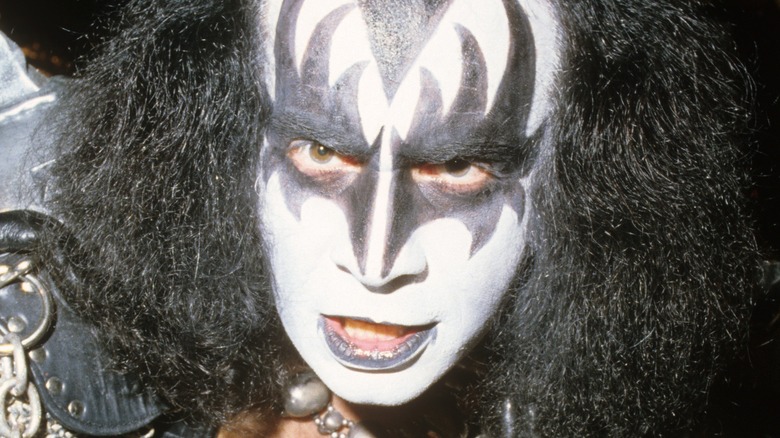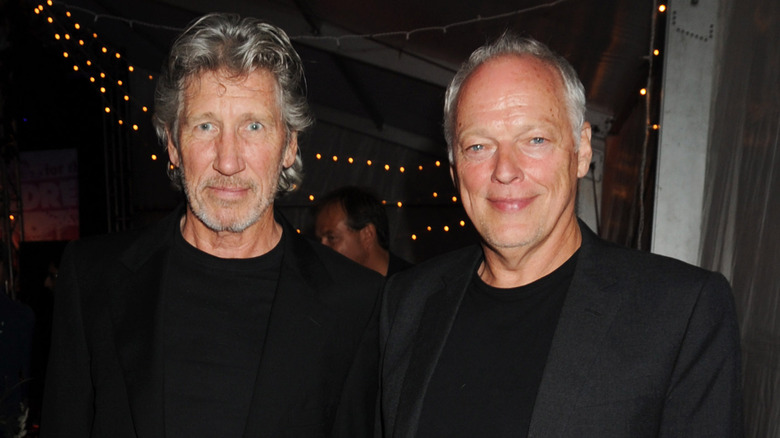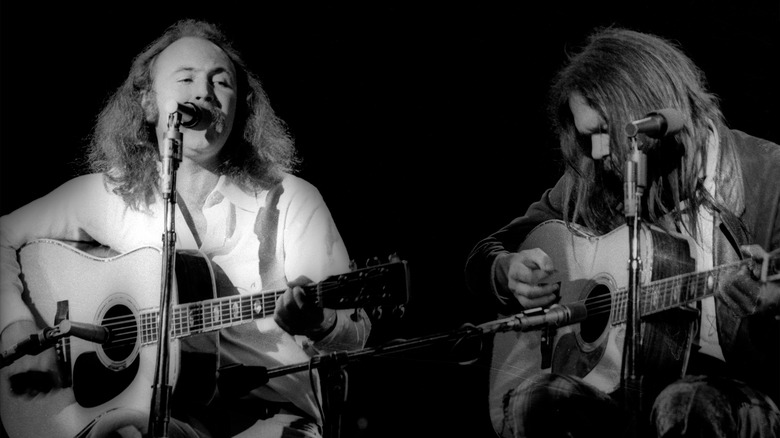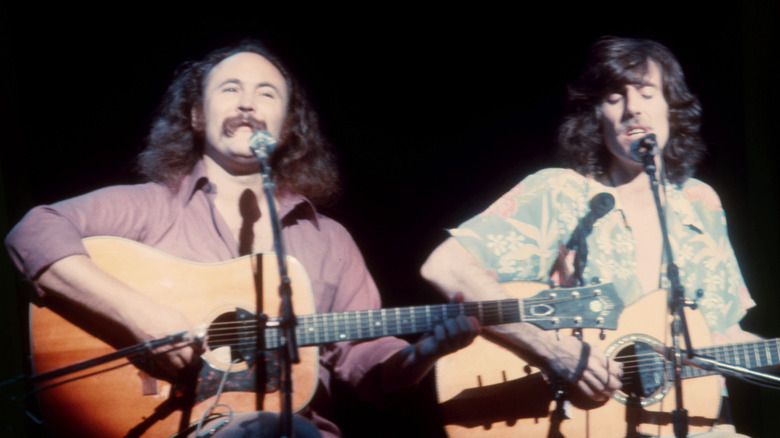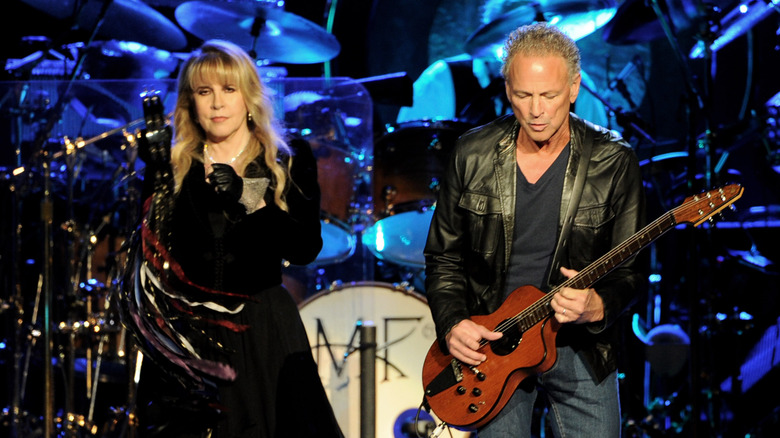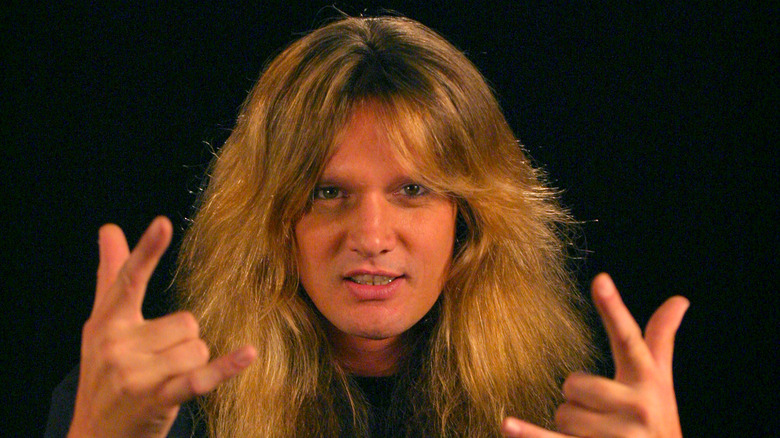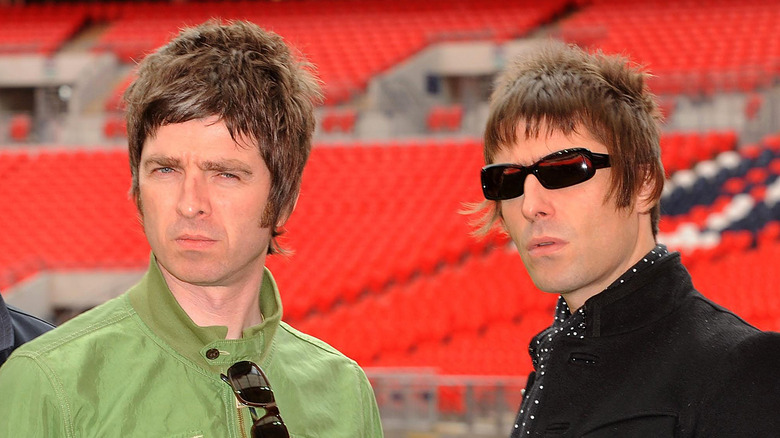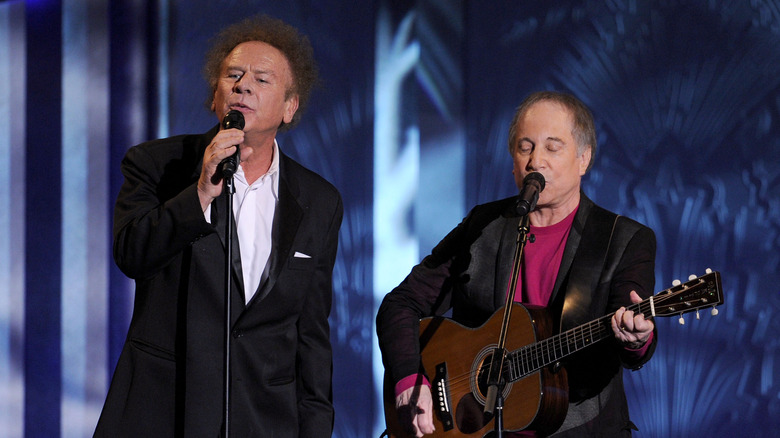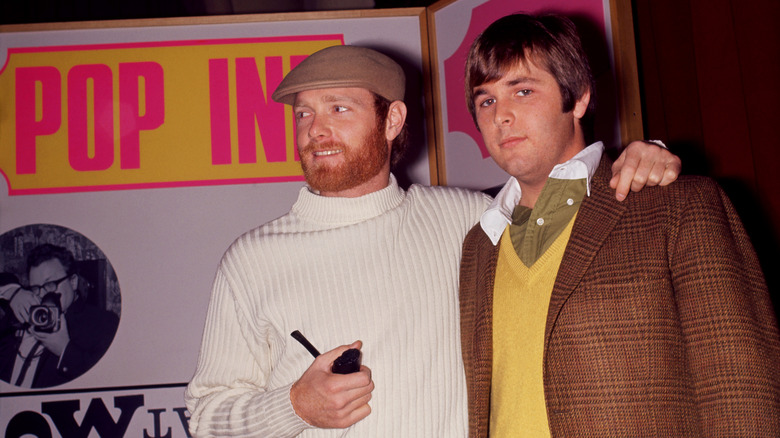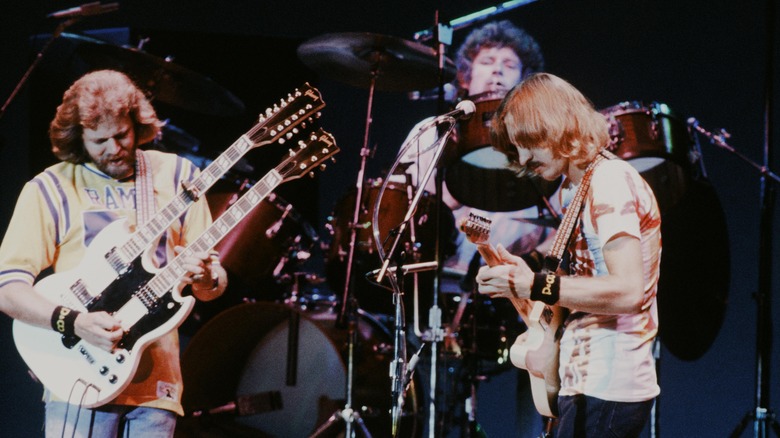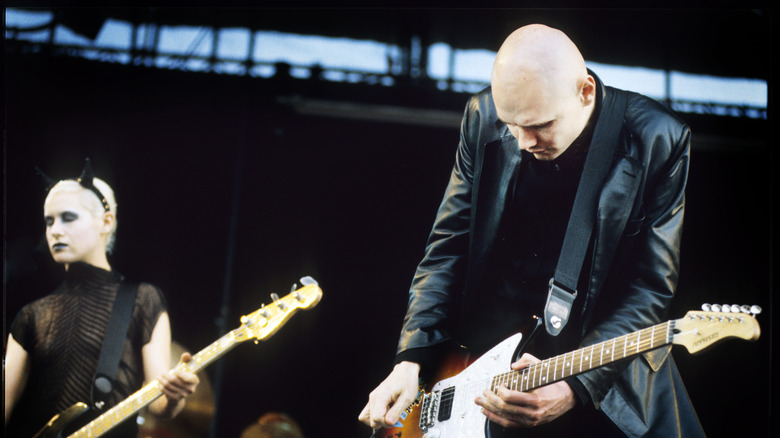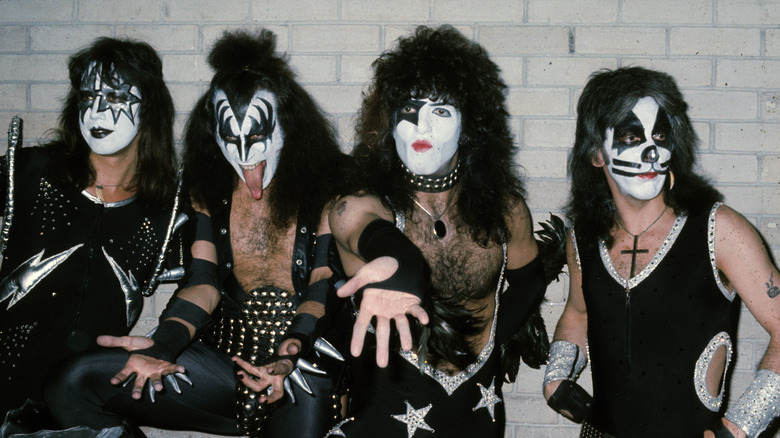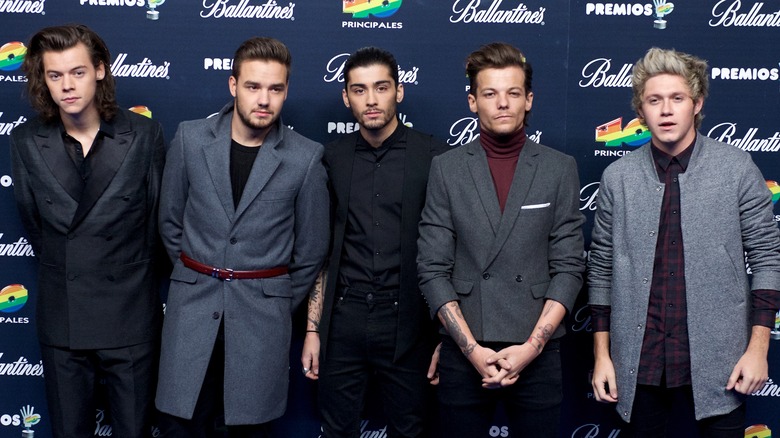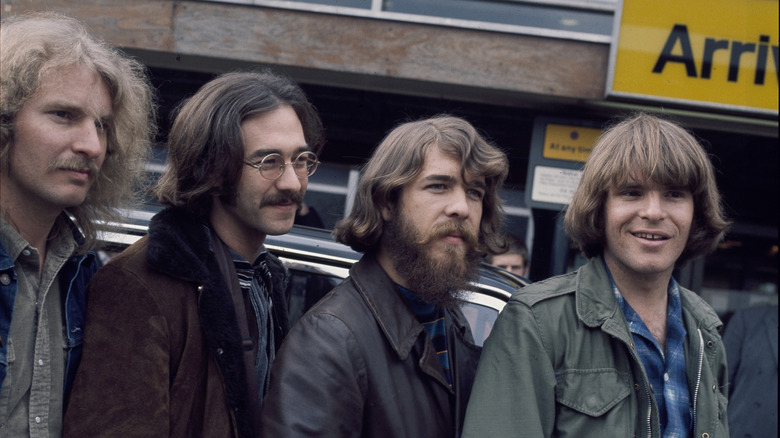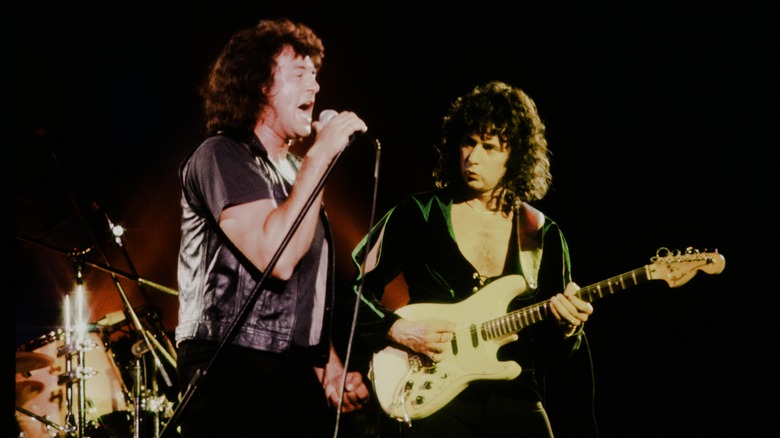Musicians Who Refuse To Work Together
Musicians can be mercurial people, and that's proven to be true within some of rock music's most notable partnerships. Take guitarist/songwriter Pete Townshend and singer Roger Daltrey of The Who, who can boast more than 50 years as bandmates but once fought so bitterly that Daltrey feared he may have killed Townshend during one of their legendary rows, as he recalled in his memoir, "Thanks a Lot Mr Kibblewhite: My Story." Then there are brothers Chris and Rich Robinson of The Black Crowes, whose well-chronicled feud led to a nasty split, per Billboard; it should be pointed out, however, that the battling brothers were able to put their differences aside in 2019 when they announced a reunion tour in an interview on "The Howard Stern Show" — proving once again that it's money, not time, that heals wounds.
Numerous others have followed the lead of those rockers, with the promise of a lucrative payday leading many warring bandmates to bury their respective hatchets over the years. However, that hasn't always been the case. As it turns out, there are some feuds that remain so deep and unsolvable that no amount of money can ever entice performers to work together again, as someone who was once seen as a trusted musical collaborator has become a full-fledged nemesis.
From some legendary classic rockers to an iconic boy band to arguably the most celebrated folk duo of all time, keep on reading to find out about these musicians who refuse to work together.
Roger Waters has been at odds with Pink Floyd guitarist David Gilmour for decades
Pink Floyd hit its commercial zenith with its mammoth tour for the 1979 album "The Wall." However, it was also during that tour that tensions between bassist/singer Roger Waters — who wrote the bulk of the double concept album — and guitarist David Gilmour had deteriorated to the point that Waters parted ways with the band. "Roger was a bit of a megalomaniac," Gilmour told Consequence. In 1986, Waters unsuccessfully sued to prevent his former band from using the Pink Floyd name, calling them "a spent force creatively." More than two decades later, Waters told BBC News he was "wrong" to sue. "Of course I was."
Gilmour and Waters were subsequently able to set aside their differences occasionally (such as closing out the 2005 Live 8 concert, and a one-off 2010 performance to mark the 30th anniversary of "The Wall"). However, their relationship can best be characterized as mutual animosity that has only grown nastier over the years. Discussing his bandmates' ongoing feud, Pink Floyd drummer Nick Mason told Rolling Stone in 2018 that he felt it was "really disappointing that these rather elderly gentlemen are still at loggerheads."
In 2020, Waters recorded a YouTube video complaining that Gilmour had "banned" him from promoting any of his solo projects on the Pink Floyd social media channels and its website. "David thinks ... that he is Pink Floyd," Waters griped. "I'm irrelevant, and I should just keep my mouth shut."
The bad blood between Neil Young and David Crosby quashed a CSNY reunion
Despite a name that sounded more like a law firm than a rock band, Crosby, Stills, Nash & Young remain one of rock's pre-eminent supergroups. Throughout the years, members David Crosby, Stephen Stills, Graham Nash, and Neil Young have reunited frequently, and in various other iterations (such as the Stills-Young Band, and a few Crosby-Nash collaborations).
However, hopes that the septuagenarian rock icons would reunite one final time have been stymied by Young's refusal to ever work with Crosby again — let alone be in the same room with him. The problem stems from some comments Crosby made after Young ended his 36-year marriage and began dating actor Daryl Hannah, now his wife. In 2014, Crosby described Hannah to the Idaho Statesman (via UCR) as "a purely poisonous predator."
Years later, Crosby told The Guardian that he bears full responsibility for creating the rift. "Neil has got a genuine beef," Crosby admitted. "I did say something bad about his girlfriend. ... OK, he can be mad at me. That's all right." Crosby even offered an apology during a visit to "The Howard Stern Show" (via Rolling Stone), admitting, "I was completely out of line. I have screwed up massively." Young subsequently appeared on "Stern" (as reported by Rolling Stone), vowing a CSNY reunion would "never happen." Young also shrugged off Crosby's apology: "There's nothing to apologize for. It was fixable, but it didn't get fixed."
Graham Nash isn't speaking to David Crosby either
CSNY member Graham Nash also has issues with David Crosby, and their relationship is even more rancorous. In a 2015 interview with Dutch magazine Lust for Life (via Rolling Stone), Nash laid it all out. "I don't like David Crosby right now. He's been awful for me the last two years, just f***ing awful. I've been there and saved his f***ing ass for 45 years, and he treated me like s***." Crosby, Nash added, "has ripped the heart out of Crosby, Stills, Nash & Young."
Nash had more to say in a 2016 interview with Billboard. "There will never be another Crosby, Stills & Nash record or show," he declared. "Right now, I don't want anything to do with Crosby at all. It's just that simple." Speaking with the Pittsburgh Post-Gazette in 2019, Nash insisted there were no discussions about a reunion, "and there won't be. And none of us are speaking to David. Not me, not Stephen, not Neil. And that's the way it is."
Crosby, however, contended he had his own gripes with Nash. "He gave the impression of looking after me, but apparently that was all just trying to keep the money coming. But there you go," Crosby told The Guardian, noting that he and Nash "haven't talked for a couple of years. And I'm not going to talk to him. I don't want to talk to him. I'm not happy with him at all."
Stevie Nicks vowed to never perform again with Fleetwood Mac bandmate Lindsey Buckingham
When Stevie Nicks and Lindsey Buckingham joined Fleetwood Mac in 1974, the two were partners both musically and romantically, ready to pack it in after their debut album, "Buckingham Nicks," flopped. In the years that followed, the addition of Buckingham and Nicks propelled Fleetwood Mac to heights the band had never before approached, culminating in the mega-hit 1977 LP "Rumours," still one of the biggest-selling albums of all time.
Fleetwood Mac's intra-band drama was also legendary. Before recording "Rumours," Buckingham and Nicks had split, per Rolling Stone, with Nicks then embarking on an affair with drummer Mick Fleetwood. Despite everything, the band soldiered on for decades as a top touring act. However, that came to a screeching halt in 2018 when Rolling Stone reported Buckingham was "fired" due to "a disagreement over the band's upcoming tour." In a subsequent interview with the Los Angeles Times, Buckingham shared his version of events, claiming Nicks threatened to quit if a planned tour was delayed so he could do some solo work. Nicks countered with a statement dismissing Buckingham's account as "revisionist history," explaining she was simply "no longer willing to work with him," per Rolling Stone.
Fleetwood Mac's Christine McVie explained Buckingham's firing to Mojo (via NME) as "the only route we could take, because there was too much animosity between certain members of the band at that point ... it was either just completely break up the band or make the best of it."
A rift between Skid Row and singer Sebastian Bach has spanned decades
Skid Row was among the hottest heavy metal acts of the late 1980s, but the band's story took a dramatic turn in 1996 when frontman Sebastian Bach was fired. Tensions between Bach and his bandmates were already high when the singer told the rest of the group that he "didn't like" some new songs they sent him and refused to sing them, Bach recalled to Legendary Rock Interviews. As guitarist Scotti Hill revealed on "Another FN Podcast," the final straw was when Bach "said some horrible things" in a voicemail for guitarist Dave "Snake" Sabo, "and Snake says, 'You know what? I'm not gonna be in a band with you anymore.'" According to Hill, reuniting with Bach was out of the question, insisting he and the other band members didn't want to "put ourselves in a volatile situation and be unhappy and destroy what we have now."
Meanwhile, Skid Row bassist Rachel Bolan told "The Chuck Shute Podcast" he hadn't seen Bach "in years," and had no problem with that. "I wouldn't say we were friends. We were bandmates," he said.
Speaking with Billboard in 2019, Bach admitted the reason he hadn't spoken with any of his former bandmates in more than 20 years was because "they f***ing hate me." However, Bach held the door open for a reunion and insisted he held no grudges. "Unlike them, it is physically and mentally impossible for me to be mad at somebody for so long — 23 years!" he said.
The feud between Oasis brothers Noel and Liam Gallagher is legendary
Oasis took the world by storm in the 1990s, with Beatles-influenced hits such as "Don't Look Back in Anger" and "Wonderwall" propelling the band to sell an estimated 70 million albums — even making it into the Guinness Book of World Records for "the longest Top 10 U.K. chart run" by any group, per Digital Spy.
That massive success was ultimately derailed by the tumultuous relationship between the band's co-founders, brawling brothers Noel and Liam Gallagher. As Rolling Stone recalled, Noel quit the band on several occasions but ultimately returned. However, tensions between the siblings boiled over in 2009 when Noel issued a statement announcing he'd quit Oasis, mid-tour, insisting that "I simply could not go on working with Liam a day longer." This time, he did not return, and the band ultimately broke up for good.
In the years that followed, the chill between the brothers did not thaw, and the rise of social media gave Liam a whole new way in which to slag his brother. Among these were a series of bizarre Twitter posts in which Liam tweeted photos of his estranged brother along with the caption "Potato." In a 2017 interview with The Times, Noel suggested that Liam "needs to see a psychiatrist." Speaking with BBC4's "Front Row" a few weeks later, Noel complained that his brother's nasty tweeting "only heightens my resolve that I'll never walk the stage with that band again."
Paul Simon and Art Garfunkel have disliked each other since the '60s
Simon & Garfunkel were famed for the sweetness of harmonies, yet there's been nothing harmonious about the volatile relationship between Paul Simon and Art Garfunkel.
After the duo's rancorous split in 1970, they managed to set aside their differences for several lucrative reunions over the years, including their wildly successful 1981 concert in NYC's Central Park — performing for a crowd estimated at 500,000 — and various tours after that. Despite the millions they were raking in, their relationship was fraught during their 1993 tour. Simon's manager, Joseph Rascoff, shared his recollections in the biography "Paul Simon: The Life." "I genuinely believed that if there had been a knife on the table one of them would have used it," he said of one particularly vicious fight. The final straw came when several dates on a 2010 reunion tour had to be canceled after damage to Garfunkel's vocal cords led his voice to give out, leaving Simon miffed. "He let us all down. I was tired of all the drama," said Simon, per biographer Robert Hilburn.
Speaking with The Telegraph in 2015, Garfunkel was hopeful for another reunion, yet also referred to Simon as an "idiot," a "jerk" and "a monster." In a subsequent interview with Rolling Stone, Simon kiboshed those hopes when he said any future reunion with Garfunkel was "out of the question. We don't even talk."
Brian Wilson and Mike Love have gone to war over The Beach Boys
When The Beach Boys formed in 1961, the lineup featured brothers Brian, Dennis, and Carl Wilson, cousin Mike Love, and friend Al Jardine. As the band's success grew, it became apparent that Brian — who wrote the band's hits — was a full-fledged musical genius. However, he was also suffering from some serious mental health issues, culminating in a "nervous breakdown" that led him to stop touring with the band, and instead he focused on recording, per Gaslight Records.
A massive rift eventually grew between Brian Wilson and Mike Love as Brian's mental health deteriorated during the 1970s, ultimately leading the rest of the band to fire him. Love stepped up as the band's de facto leader as the band became predominantly a touring act, and for the next few decades, the cousins communicated only through lawyers — including Love successfully suing for songwriting credit on some of the band's biggest hits. "There was always the perception that my cousin Brian did all the writing as well as the producing and stuff like that. That was not true," Love told the Sarasota Herald-Tribune. "I was the co-author of so many of the big hits."
Brian is no fan of his cousin, once remarking, "I don't like Mike Love at all. ... his attitude is too egotistical. I can't be around the guy." In his autobiography "Good Vibrations," Love wrote, "For those who believe that Brian walks on water, I will always be the Antichrist."
Don Felder is persona non grata in the Eagles since his 2001 firing
When guitarist Don Felder joined the Eagles, he brought a harder, guitar-driven edge to their mellow, country-rock sound — in addition to writing their signature song, "Hotel California." As the group's popularity escalated, so too did tensions between Felder and bandmate Glenn Frey; by the end of the 1970s, reported the Independent, Felder and bandmate Glen Frey "loathed each other." That animosity ultimately led to an appearance where the two men played their set, but talked about how much they wanted to fight when the set was over. Afterward, Felder smashed his guitar and then left in a limo. The Eagles broke up soon afterward.
The band reunited in 1994 for their aptly titled Hell Freezes Over tour and continued to both tour and make records. In February 2001, Felder was fired for undisclosed reasons. Felder fought back with a wrongful termination lawsuit that also attempted to dissolve the Eagles as a business entity, alleging that "the greed of [Don] Henley and Frey became more insatiable with each new project." As UCR pointed out, Felder's suit was ultimately settled, the terms remaining confidential.
After Frey's death in 2016, Felder told AP he felt "unbelievable sorrow" upon hearing the news. "I had always hoped somewhere along the line, he and I would have dinner together, talking about old times and letting it go with a handshake and a hug," he mused.
Billy Corgan didn't invite Smashing Pumpkins bassist D'Arcy Wretzky for the reunion
Formed in the late 1980s, Smashing Pumpkins exploded into the mainstream with the band's second album, 1993's "Siamese Dream," and cemented their status with the 1995 followup "Mellon Collie and the Infinite Sadness." Just a few years later, frontman Billy Corgan announced in 2000 that they were breaking up.
Nearly two decades later, in 2018, Corgan revealed the band was reuniting for a tour, joined by original members James Iha and Jimmy Chamberlin. Original bassist D'Arcy Wretzky, however, was not mentioned as being part of the reunion plans, with Jeff Schroeder taking over bass duties. Wretzky confirmed she was not invited back, telling BlastEcho she had "only just found out yesterday that the band has decided to go with a different bass player."
This led to a series of back-and-forth missives in the press. While Corgan claimed he'd reached out to her repeatedly and been rebuffed, Wretzky told Alternative Nation that was a "complete lie." The band ultimately embarked on its Shiny and Oh So Bright tour — sans Wretzky. In 2020, Corgan confirmed that Wretzky would never be part of any future Smashing Pumpkins iteration. "D'arcy, that's a dead end," he told Premier Guitar. "That's what I always tell people: She made it very clear that the bridge is burned."
Paul Stanley and Gene Simmons vs. Ace Frehley and Peter Criss
With their fire-spewing stage antics and instantly identifiable kabuki-style face paint, KISS exploded on the rock scene in the 1970s. While the band's membership has fluctuated significantly over the years, bass player Gene Simmons and Paul Stanley have remained the hard-rocking backbone of the outfit.
As fans well know, the original lineup featured Stanley and Simmons alongside lead guitarist Ace Frehley and drummer Peter Criss. Criss was famously fired in 1980, Stanley wrote in his 2014 book "Face the Music," after a series of drug-fueled clashes with Simmons and Stanley. Frehley parted ways with the band in 1982. Frehley and Criss were rehired in 2000, noted UCR — not as full-fledged band members, mind you, but as salaried sidemen. Criss (but not Frehley) returned for more shows in 2003.
As Simmons explained in a 2019 interview with Guitar World, firing the two original members, repeatedly, wasn't personal. "Ace and Peter have gotten three chances," Simmons explained. "They were in and out of the band — fired — three times. For drugs, alcohol, bad behavior, being unprofessional ... all the clichés are clichés." According to Simmons, the two "weren't carrying their load. You can't be in a car with two flat tires." While Simmons insisted he remained open to the pair joining the band "here and there," he also declared that "they're never going to be in KISS again."
Zayn Malik kept trash-talking One Direction
When Zayn Malik left One Direction in 2015, it preceded a still-ongoing "hiatus" that's seen all of the group's members launch solo careers. While Malik's bandmates initially responded with tears and claims of being "deeply saddened," it wasn't long before the rancor eventually spilled out.
That was particularly true of comments Malik made about 1D. Months after his exit, for example, Malik sniped to Fader that One Direction's music was "generic as f***." He then told Apple Music's Beats 1 (via Hollywire) that he "never really wanted to be there, like in the band," but simply "gave it a go." In a subsequent interview with Capital FM host Dave Berry (via the Daily Star), Malik admitted he and 1D's Louis Tomlinson were "not talking on friend terms obviously," and he complained to NME that "nobody's reached out" from the band.
Years later, Malik was still griping about his ex-bandmates. "To be honest, I never really spoke to Harry [Styles] even when I was in the band. So I didn't really expect that much of a relationship with him," he told Us Weekly in 2017, and in 2018, he told GQ that "I didn't really, like, make any friends from the band. I just didn't do it." Then, interviewed by British Vogue, Malik alluded to "things that were said after I left. Snide things. Small things that I would never have expected." Speaking with The Sun in 2020, Niall Horan admitted that Malik "left for his reasons and then he never really spoke to us much afterwards."
Only death could end John Fogerty's bitter feud with brother/Credence Clearwater Revival bandmate Tom Fogerty
One of rock's nastiest band breakups was that of Credence Clearwater Revival, known for such hits as "Fortunate Son" and "Proud Mary." When the band dissolved in the early 1970s, noted Uncut, frontman and principal songwriter John Fogerty was dismayed to discover the band's label, Fantasy Records, owned his songs, not him. Even more disturbing was that Fogerty's brother and former bandmate, Tom Fogerty, sided with Fantasy owner Saul Zaentz in the dispute.
As a result, the brothers battled for decades as a flurry of lawsuits was filed, with John frustrated to be prohibited from performing any of the Credence hits that he wrote and sang. When he was finally freed from the shackles of his Fantasy Records deal, he released his first solo album, 1985's "Centerfield" — which led to a lawsuit from Zaentz, who claimed that John's single "The Old Man Down the Road" was a ripoff of CCR's 1970 hit "Run Through the Jungle." "In 1988 I had to go through a plagiarism trial where I was sued for sounding like myself," John told The Guardian, "and people tell me this was unprecedented." When his brother died in 1990, John commented, "it was very unresolved and very sad."
CCR bassist Stu Cook summed it up succinctly when he described the brothers' decades-long quarrel to The Guardian as "the saddest story in rock and one of the longest ongoing stupid feuds."
Ian Gillan's feud with Deep Purple guitarist Richie Blackmore dates back to the '70s
Ian Gillan joined British hard rock outfit Deep Purple in 1969, serving as the band's lead singer during its most successful period in the 1970s and lending his distinctive pipes to such hits as "Smoke on the Water." By 1973, recalled Louder, tensions with temperamental guitarist Ritchie Blackmore had become too much for Gillan, who tendered his resignation in a letter (Blackmore quit the band a few years later).
Gillan and Blackmore put their differences aside when the "classic" lineup of Deep Purple reunited in 1984. As was the case before, Gillan and Blackmore did not get along, typified by the latter's infamous quip, "I'm going to attack Ian Gillan in a back alley." Gillan exited a second time, in 1989, but then subsequently rejoined Deep Purple in 1992, with Blackmore departing the following year amidst increasing onstage friction between the two.
Asked in a 2021 "Tales from the Road" interview (via Blabbermouth) whether he and Blackmore would ever reunite onstage, Gillan replied, "No ... needless to say, it was all pretty nasty when we finished and Ritchie walked out." According to Gillan, he and the rest of the band "never had any antagonism towards Ritchie. He has his own interpretations, and the rest of us have our interpretations, so it's really not worth being fired up about it." Reuniting with Blackmore, Gillan added, "would be no fun at all."

